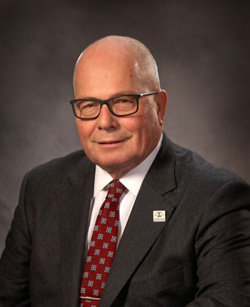ISBA Development Site
This website is for ISBA staff use only. All visitors should return to the main ISBA website.
This website is for ISBA staff use only. All visitors should return to the main ISBA website.
February 2019 • Volume 107 • Number 2 • Page 8
Thank you for viewing this Illinois Bar Journal article. Please join the ISBA to access all of our IBJ articles and archives.
As the Illinois Supreme Court weighs options for fee sharing with nonlawyers, the ISBA remains opposed to the practice.

The Illinois Supreme Court Committee on Professional Responsibility is considering proposals to change the Illinois Rules of Professional Conduct to allow fee sharing with nonlawyers. In Illinois, as in most states, fee sharing is prohibited by the Rules of Professional Conduct. Our supreme court also has said, for good reason, that fee sharing is against public policy (O'Hara v. Ahlgren, 127 Ill. 2d 333 (1989)). Other professions treat the issue similarly. The Illinois Supreme Court also has rejected fee sharing in the medical field. In real estate, brokers are prohibited from paying referral fees to nonbrokers.
But, as we know, the world and the legal profession are rapidly changing. The internet, with its seemingly unlimited ability to provide information and advice (regardless of their validity or accuracy), and the economic reality of practicing law are pressuring lawyers to face the prospect of new ways of conducting business. On a national level, any number of for-profit nonlawyer businesses have entered the legal services marketplace, often without regard to the restrictions of existing professional conduct rules. In addition, the American Bar Association has sought, unsuccessfully to date, to liberalize fee-sharing prohibitions and allow alternative business structures that can take advantage of the relaxed rules. In Illinois, the Attorney Registration and Disciplinary Commission has published a study suggesting fee-sharing restrictions be liberalized. The Chicago Bar Foundation (the charitable arm of the Chicago Bar Association) also is advocating changes to allow fee sharing with nonlawyer entities. The proposed rule amendment would allow a lawyer or law firm to pay a portion of a legal fee to an entity that "connects" clients to them. In contrast to these efforts, the ISBA has proposed unequivocally to keep the fee-sharing prohibition, but with some additional guidance to clarify otherwise permissible lead generation.
The rationale brought forth for fee sharing is that it would allow "access to justice" via more affordable legal services. The ISBA certainly shares this laudable and important goal and has a rich and long tradition of supporting access-to-justice efforts. However, whether eliminating the prohibition on lawyers sharing fees with nonlawyers serves this goal in a material way is an unanswered question. No data exists to show how inserting a for-profit entity between clients and their lawyers will increase the ability of economically challenged Illinoisans to seek out and use a lawyer's services. Conversely, some recent surveys of the legal marketplace tend to indicate that people do not use lawyers for nonfinancial reasons. It is difficult to see how liberalization of fee-sharing prohibitions would address these nonfinancial factors. In addition, the concerns raised by the court in concluding that fee sharing is against public policy remain. Finally, eliminating the fee-sharing prohibition affects solo and small-firm lawyers the most. It is unfair and unwise to attempt to solve the access-to-justice problem on the back of this significant segment of the bar.
A more viable solution to the access-to-justice issue should be strong support of pro bono legal services by every lawyer in Illinois. Every Illinois lawyer should accept the challenge of providing pro bono legal services in order to assist residents who need and want legal services. Another possible solution could be increased funding for legal aid organizations.
The ISBA stands firm that lawyers should not share fees with nonlawyers. The attorney-client relationship is one of confidentiality and trust. Interjecting an intermediary into that relationship potentially drives a wedge between the attorney and the client in that relationship. In addition, it is not hard to imagine that large nonlawyer legal-service providers eventually would be in a position to direct the type, nature, and extent of legal services between clients and attorneys. This could greatly affect the quality of legal services and diminish the personal approach to individualized service. Finally, if the fee-sharing prohibitions are liberalized, the door may be opened to justify even more modifications to the legal-business structures. Such modifications could economically affect the practice of solo and small firms forever in Illinois. The ISBA remains steadfast in its support for the prohibition on fee sharing between lawyer and nonlawyers in Illinois.